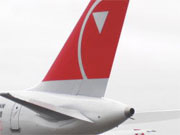 |
| Bankruptcy is likely to change who is at the helm in the Northwest boardroom. (MPR file photo) |
St. Paul, Minn. — A company's board of directors oversees the firm's management. At a publicly held company like Northwest, the directors are chosen by the company's owners -- in other words, those who hold the company's stock. Some directors may themselves be among the largest shareholders.
In bankruptcy, Northwest stock will probably become worthless. New investors -- banks, other companies, wealthy individuals -- will likely offer up cash to keep Northwest going. In return, they'll become the new owners. The people, companies and banks to whom Northwest owes money may also receive part ownership as compensation for the money Northwest owes them.
For many of the 11 men and one woman who currently serve as Northwest directors, the equation is probably simple: When the new owners come in, they're out.
"I think they're resigned to it, because that's the normal course," says Howard Wu, an attorney specializing in airline bankruptcies with the Twin Cities law firm Fafinski Mark and Johnson.
Wu also served as counsel at US Airways through its first bankruptcy three years ago. US Airways emerged from Chapter 11 in early 2003. Wu says the new investors -- or "equity holders" -- including the Retirement System of Alabama, installed a whole new board of directors.
|
We're always excited at the prospect of somebody new coming in -- a 'white knight' or somebody who might take a different approach with regard to labor.
- Peter Fiske, Professional Flight Attendants Association
|
"More often than not, when you have a bankruptcy and the company emerges -- particularly when new equity is invested -- you can expect the current board will no longer be in place," Wu says. "It's just normal."
Wu says this rule generally does not apply to board members who are also senior managers, such as Northwest CEO Doug Steenland. A new board, however, could later decide to replace Steenland and other executives.
The Northwest board includes the heads of a number of investment firms, as well as former Michigan Gov. John Engler and historian Doris Kearns Goodwin. The chairman of Northwest's board is Gary Wilson, who was instrumental in a buyout of the airline in 1989.
Rajesh Aggarwal, an expert on corporate bankruptcy at the University of Minnesota's Carlson School of Business, doubts Wilson will remain on the board.
"In his case, it would be hard for the new majority shareholders to want to retain him at all," Aggarwal says.
This spring, as Northwest's situation worsened, Wilson began regularly selling his Northwest shares, taking in more than $16 million between May and August. Northwest and Wilson, through the airline, declined to comment for this story.
Even though Wilson has said the stock sales were part of a prearranged schedule, Aggarwal says nothing about the sales would endear him to the company's future owners.
"That's one of those situations where nothing about it looked particularly good," Aggarwal says. "As far as I know, no laws were violated in selling those shares, but it was a pretty profound vote of no confidence in the company."
Some board seats seem less likely to turn over. The CEO of Dutch airline KLM sits on the board, and serves as a functional bridge to Northwest's important European partner.
Three unions also have seats gained as a result of previous concessions. The pilots and groundworkers unions have representatives on the board, but also on the creditors' committee that will negotiate Northwest's emergence from bankruptcy. The unions will likely push to keep their seats on any new board.
The flight attendants previous union, the Teamsters, has a board seat, but the current union, the Professional Flight Attendants Association, does not.
PFAA spokesman Peter Fiske is hopeful that restructuring may at last leave the union with a board seat. But he says employees could also benefit from the turnover that seems likely among other directors.
"We're always excited at the prospect of somebody new coming in -- a 'white knight' or somebody who might take a different approach with regard to labor -- anybody that's possibly going to take a less adversarial approach," Fiske says. "We're always optimistic. But again, we're not going to get overly excited because we'll just wait and see how it all plays out."
Fiske and other workers could be waiting for a while. Any new board members would be appointed by the new owners of the company. And as of yet it's unclear who will own a restructured Northwest.




